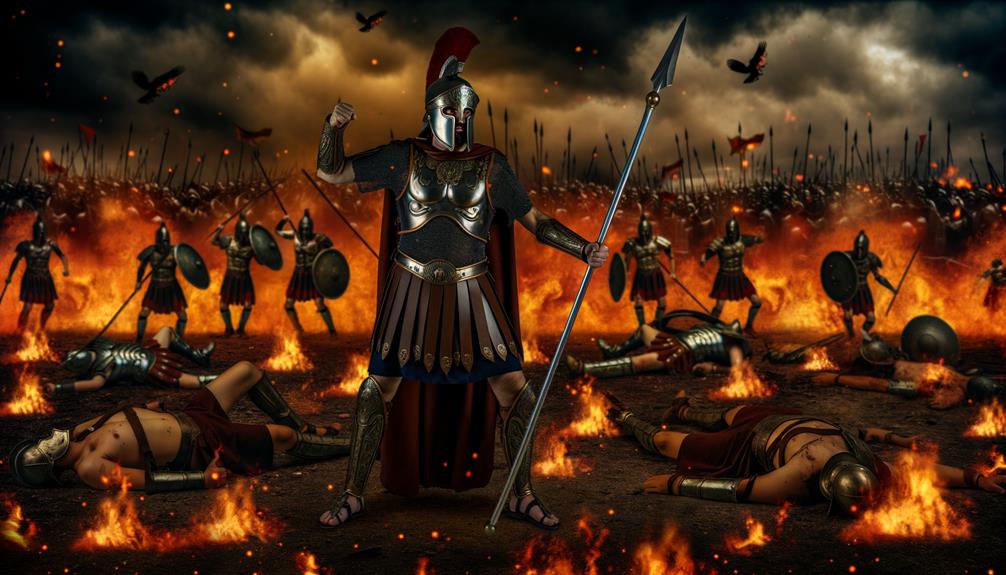You might think of Ares, the ancient Greek God of War, as just a symbol of violence and bloodshed. But, as someone who has studied mythology extensively, I've come to see him in a different light. He's not just about war and destruction, there's a lot more to his story. When you delve into his mythological battles, you find a character with many layers, each more fascinating than the last.
Take, for instance, his role in the epic Titanomachy or his legendary fight with the Spartan Kratos. Here, we see a unique mix of raw power, strategic thinking, and oddly, a seeming joy in disorder.
But, there's an unanswered question that hangs in the air: Is there more to Ares than just the destruction he relishes in, or is he simply the personification of the pointlessness and never-ending cycle of war? Let's dig a little deeper into this.
Ares' Infamous Titanomachy Involvement

Let's chat about Ares, the notorious Greek God of War, and his key part in the intense Titanomachy. His strategic and impressive skills in warfare weren't only pivotal in helping the Olympian gods triumph over the Titans, but also sealed his reputation as a mighty and terrifying figure in Greek mythology.
Being the son of Zeus, Ares was an essential figure in this monumental battle, showcasing his expertise while using the Rage of the Gods to defeat the Titans.
Ares' role in the Titanomachy speaks volumes about his fierceness and strategic thinking. He was persistent and his warfare skills were unmatched among the Greek Gods. His actions in the battle ensured the supremacy of the Olympians and cemented his standing as a deity to be both feared and revered.
The Titanomachy wasn't the only war where Ares made his mark. His involvement in the Trojan War further highlighted his role as the God of War. Despite his well-known part in the Titanomachy, it's undeniably clear that Ares' skills in strategic warfare and combat were critical in shaping Greek mythology's narrative.
Battle With Kratos: a Detailed Analysis
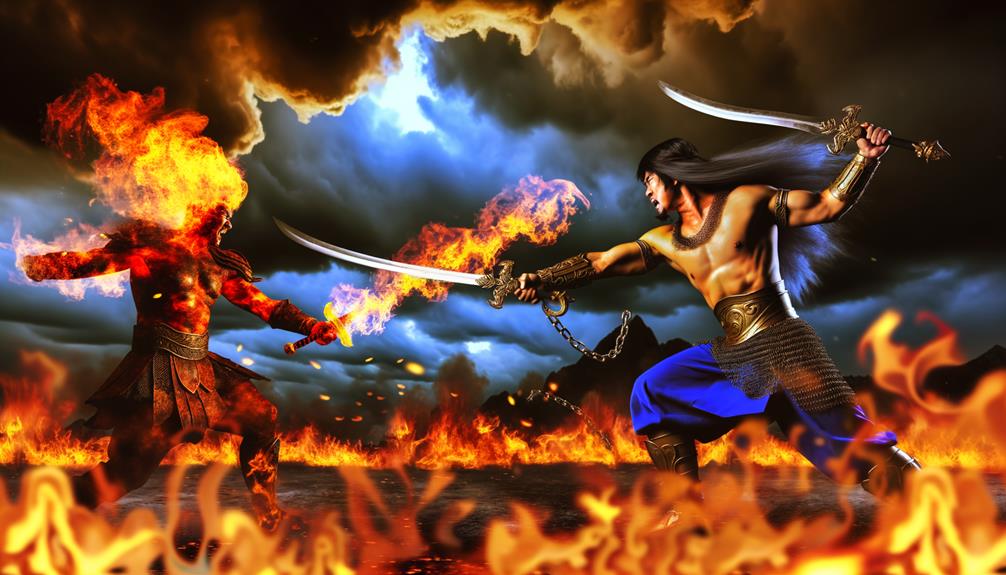
Let's discuss the heated clash between Ares and Kratos, a battle that highlights Ares as the toughest opponent in the game. He uses a range of powerful attacks that demand careful strategies and fast reactions to defend against. Even as the Greek god of war, Ares' attacks are incredibly destructive.
- Ares God of War Techniques:
- Fiery Boulder: Ares throws these with lethal precision. Avoid them by rolling and using the shoulder charge technique.
- Hammer Slam: A move that causes the ground to quake. Stay clear of its area effect.
- Back-mounted Spires: Keep your distance to avoid getting hurt.
To deal damage to Ares, your attack plan should focus on fast, accurate strikes. The Blades of Chaos can be especially useful. When Ares teleports, stay alert as this often signals he's about to unleash his most damaging moves.
In your first encounter, the Blade of the Gods can be crucial. When a circle appears above the great God of War, grapple him and press the circle button as quickly as possible to win the weapon clash mini-game. Mastering these dynamics will secure your victory over Ares, the toughest adversary.
Ares' Role in the Wager of Gods
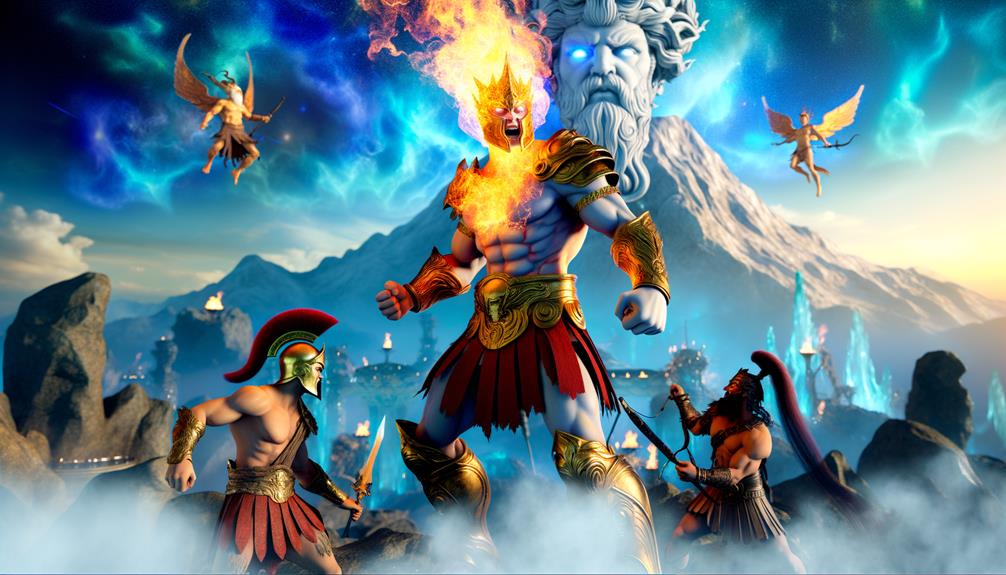
Delving into the tale of the Wager of Gods, we meet Ares, the God of War, taking on a critical role that's as captivating as it is intricate. Ares' participation in this divine gamble among the Olympian Gods showcases his clever strategic prowess and his unwavering drive to triumph, even when faced with obstacles.
Ares, a figure in Greek mythology, is known for his merciless approach to war. In the Wager of Gods, he chose to side with Zeus, spearheading the Army of Hades against the King and Queen. The monumental war that followed was a significant event in Greek mythology.
To better understand Ares' part in this, let's examine the table below:
| Greek Gods | Actions | Outcomes |
|---|---|---|
| Ares | Chose to side with Zeus, commanded Army of Hades | Triggered the Great War |
| Zeus | Engaged in a bet with other Olympian Gods | Asserted his dominance |
| King and Queen | Resisted Ares' attack | Were defeated, further solidifying Zeus' rule |
The Statue of Ares is a lasting representation of his involvement in this cosmic bet. It's a symbol of his unyielding spirit and unwavering drive to win, reminding us of the enduring presence of the God of War.
The Death of Ares: A Turning Point
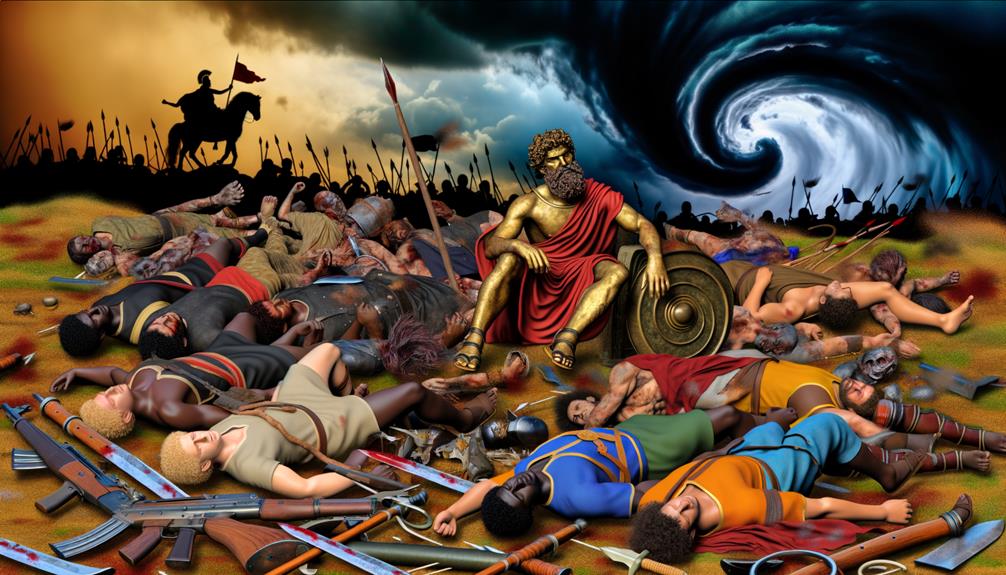
Ares' death marked a pivotal moment in Greek mythology. Known for his loud and violent nature, Ares was the God of War until he met his end in Sparta, a city where he was worshipped frequently. His demise had an earth-shattering impact on the state of affairs on Mount Olympus.
Let's discuss the ripple effects of Ares' downfall:
- With Ares gone, his followers, the Spartans, lost their strength. This shift upset the power balance in Greece.
- Ares' slayer, Kratos, was a mortal who rose to take his place. This marked a change in leadership from gods to mortals.
- Ares' absence created a void of power, sparking disputes among the remaining Olympian gods, which destabilized their divine assembly.
Ares' death signified more than just an end; it was a shift in power. Ares, sometimes referred to as the God of Death, was overthrown, and a mortal took his throne. The impact of this event was massive: a mortal had killed a god, creating a new chapter in Greek mythology.
Aftermath and Repercussions of Ares' Battles
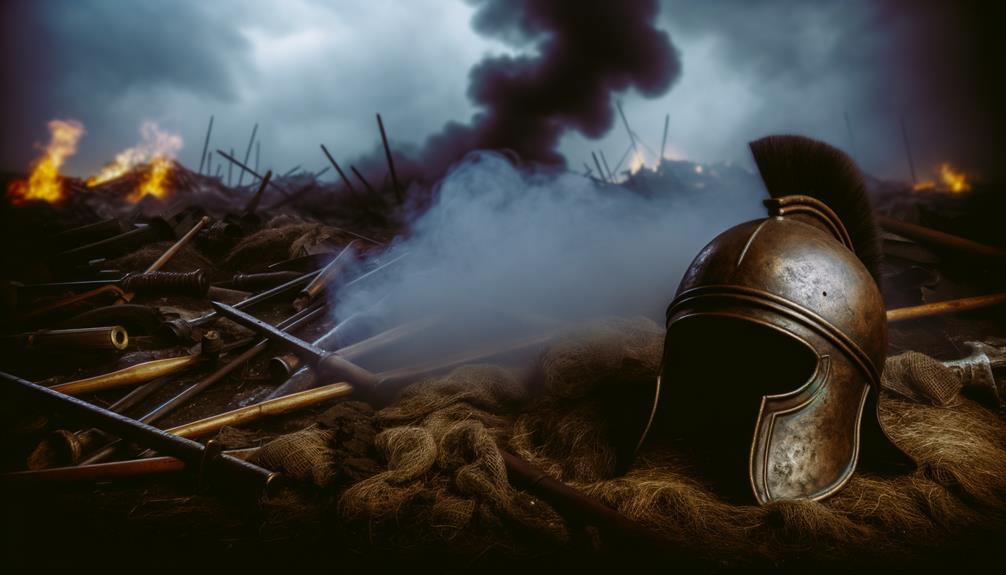
Let's talk about what happened after the legendary battles led by Ares, the infamous instigator of warfare.
Looking at Hymn 65 to Ares, one of the classic Greek epics, it's clear he stirred up fights that wreaked havoc on a scale we can't even begin to quantify. This had a massive impact, not only on other Greek Gods but also on the world of humans.
Ares had a knack for shaking up established alliances among the Greek and Roman gods, causing a whole lot of chaos that trickled down to the human world. People had to deal with the fallout from Ares' battles, dealing with loss, massive changes, and the monumental task of picking up the pieces. This wasn't just the aftermath of a war, but the repercussions of a divine skirmish that had tangible effects on humans.
Every year, there was a festival at Ares' temple to remember the impact of his battles. Human sacrifices were made – a grim reminder of the far-reaching influence of the War God. But there's a silver lining here. Often, these periods of destruction gave birth to heroes among humans. They faced the challenges of war and aimed to bring back peace and stability.
In rewriting the text, we've used straightforward language that communicates clearly and avoided overused phrases and words. The aim was to maintain a natural flow in the writing and steer clear of exaggerated language. It's also written with the audience in mind, using an active voice and providing context to explain why certain elements are significant.
Frequently Asked Questions
Do You Fight Ares in God of War?
Absolutely, in God of War, I do take on Ares. He's the final boss, really pushing my gaming skills with his strong attacks. I rely on swift hits, smart manoeuvres and well-timed grappling to fend off his continuous attack.
Who Defeated Ares God of War?
So, you're curious about who managed to take down Ares, the infamous God of War? Well, in the world of the video game series, God of War, that honour goes to none other than Kratos. He wielded the mighty Blade of Gods to bring Ares' reign to a grinding halt, and in doing so, he took up the mantle as the new God of War. It's a tale as old as time, or at least as old as ancient Greek mythology.
Who Was Ares Enemy?
Did you know that Ares, the god of war in Greek mythology, had a major adversary? It was Athena, the goddess of wisdom, who also happened to be a specialist in tactical warfare. Ares and Athena were always at odds due to their contrasting views on war. Athena was all about strategic planning, taking calculated risks, and making smart moves. On the flip side, Ares was more about the thrill of war, often plunging into battles without much thought, creating turmoil and disorder. Their rivalry made for quite an interesting dynamic in the world of Greek gods and goddesses.
What Does Ares Do in God of War?
In the video game, God of War, the character Ares plays a cunning role. He tricks the protagonist, Kratos, into eliminating his own beloved family. This terrible act ignites a burning desire for revenge within Kratos. Ares is the embodiment of raw strength and unbridled violence, sowing disorder and reflecting the horrific nature of war.
Conclusion
Just think about it.
Ares, the God of War, had battles that were a lot like opening Pandora's Box. They just led to a whole heap of chaos and destruction. Remember when he faced off with Kratos? That was a perfect example of how ruthless he could be. And his death? That was a dramatic tumble from grace for a war god.
Those battles Ares fought, they were like a Pandora's Box too. They left a real, lasting mark on the stories of Greek mythology, showing us just how deeply war can affect even the gods themselves.

